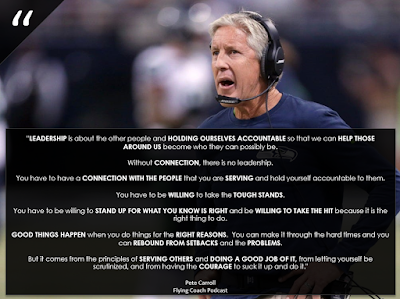Take Personal Responsibility

I have always thought it was important for me to take personal responsibility for my teams. I take personal responsibility for their engagement, their effort, their execution, their energy, and their experience. If they are performing to the standards that I have set, then it is my job to figure out how to motivate them or better teach them. I heard a pastor say that he used to be frustrated with his 8:30 AM Sunday service. He said that they would draw about 300 people, and they were the deadest and most uninspiring crowd to speak to. He would get mad and angry with them, but he said that when he started to take responsibility for lifting the people and encouraging the people, it has become one of the most delightful services to preach to. When our kids aren't paying attention in practice, we have to find a way to keep them more engaged or hold them more accountable. When our kids aren't going as hard as they can, we have to find creative ways and measurable drills to...









